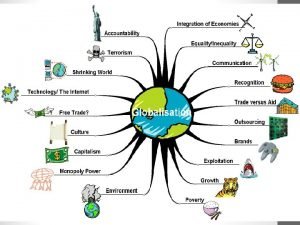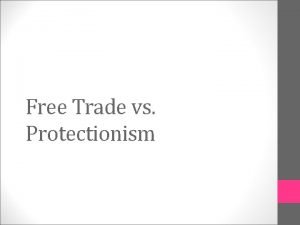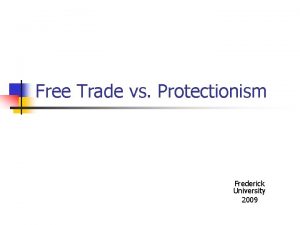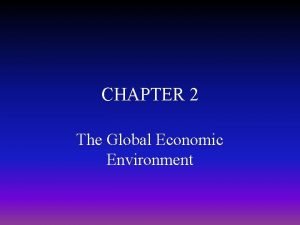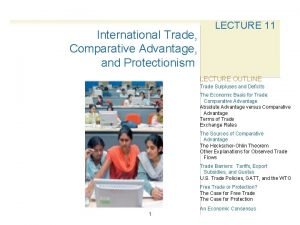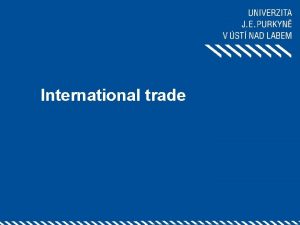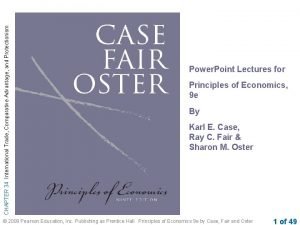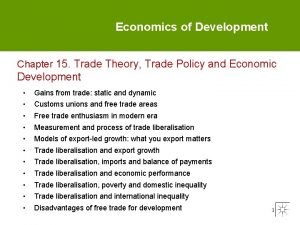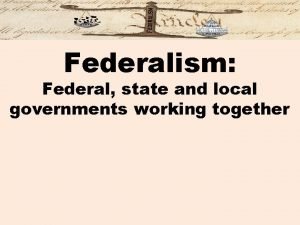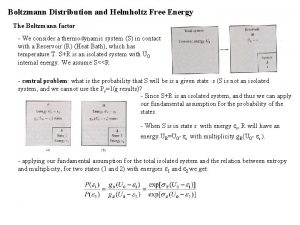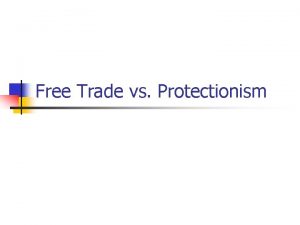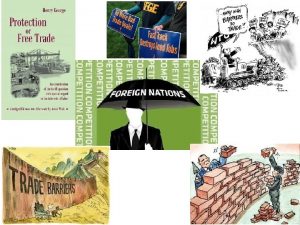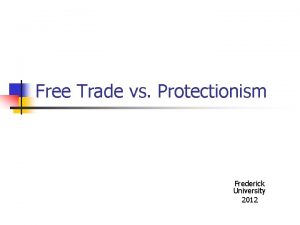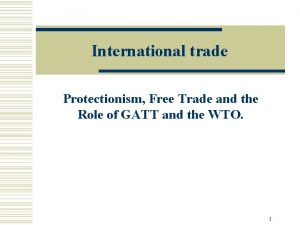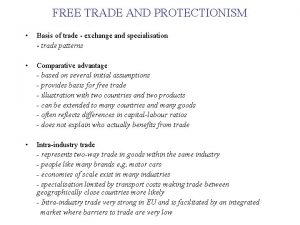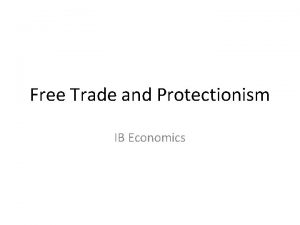Free Trade vs Protectionism Trade and the Government












- Slides: 12

Free Trade vs. Protectionism

Trade and the Government • The Govt. has the ability to influence economic relations with the rest of the world (diversification and scale of trade). • There are two opposing ways in which they can achieve certain goals: protectionism and free trade. • Both are used for specific reasons with advantages for both.

Protectionism vs. Free Trade • Free Trade: when government put in place policies that allow producers from overseas nations to freely sell their goods in our country (promote trade). • Protectionism: when government put in place policies to stop overseas producers freely selling goods in our country (restrict trade).

Arguments for Protectionism • Infant Industry: • New or start up industries that have not been operating for long • For: new industries are given the chance to develop systems and processes to get to the stage that they are able to compete against larger international producers (‘grow up’). • Against: there is no incentive for these industries to become more efficient whilst continuing to gain from the protection.

• Protecting domestic employment: • While local businesses continue to operate they provide employment. • Governments will protect our domestic employment levels as this is seen as ‘desirable’ to gain political support (more jobs=more votes). While local businesses are operating they are providing employment locally. • ‘Import substitution’ industries: industries that produce substitutions for imports (creates more jobs in NZ).

• National interest and security: • The government may see it is in our best interest to keep certain industries operating, in NZ. e. g Steel and oil production • E. g. keeping certain industries in NZ in order to maintain control of them, i. e. buying back $800 million in shares of Air NZ to prevent control shifting more so overseas. • E. g. Agricultural industry: in times of hardship with the agricultural industry being protected, this will enable us to feed our nation.

• Cheap foreign labour: • Labour should be paid at a rate that recognises the level of productivity. If NZer’s get a higher wage this should be due to higher levels of productivity, education, or skill. • If this is not the case and the wage paid does not recognise the productivity of the worker, low wage paying countries have an unfair advantage of being able to produce low cost goods (therefore making our NZ made products less desirable).

Arguments for Free Trade • Employment: • Allowing free trade will open up opportunities for additional jobs. Not only will it be those directly involved with the importing of goods and services, but also cost-effective industries will also open up (due to cheaper alternatives being available). • E. g. cheaper imported motor vehicles into NZ has meant that the costs of all sorts of vehicles is now much lower in real terms than it was 20 years ago. This has allowed transport operators to lower their costs, benefiting all industries that require transport for their business operation

• Efficient use of existing resources • Free Trade will promote a more efficient use of a nation's resources. As nations will begin to use resources from production of a good they have a comparative disadvantage in to be used in the production of a good they have a comparative advantage in. • E. g Workers from car manufacturing in NZ being rehired to agricultural sector.

• Cheaper goods and services • Free trade allows consumers access to cheaper alternatives as imports become readily available.

Government Policies for Protectionism • Import Decreasing: (To prevent or diminish the amount of imports into NZ) • Tariff (tax on an imported commodities) • Quota (limit on quantity imported of certain goods) • Rules and regulations (govt. rules that restrict entry of some goods and services to protect local producers) • Export Increasing: (To increase the amount of Exports we send) • Subsidies (payment from govt. to reduce production costs, therefore allowing a greater competitive edge via lowering price)

• THANK YOU
 Free trade vs protectionism
Free trade vs protectionism Free trade vs protectionism
Free trade vs protectionism Protectionism in trade
Protectionism in trade Protectionism pros and cons
Protectionism pros and cons Protectionism definition economics
Protectionism definition economics Benefits of protectionism economics
Benefits of protectionism economics Advantages of protectionism
Advantages of protectionism Fair trade not free trade
Fair trade not free trade National government vs federal government
National government vs federal government Helmholtz free energy and gibbs free energy
Helmholtz free energy and gibbs free energy That was then this is now summary
That was then this is now summary Free hearts free foreheads you and i are
Free hearts free foreheads you and i are International trade definition
International trade definition
